苏教版六年级英语上册Unit5单元知识归纳
苏教版六年级英语上册知识点完整版

苏教版六年级英语上册知识点集团标准化办公室:[VV986T-J682P28-JP266L8-68PNN]U n i t1T h e k i n g’s n e w c l o t h e s一、单词/词组1.long long ago 很久以前2.new clothes 新衣服3.make new clothes for you 为你制作新衣服 make sth for sb4.show the king his new clothes给皇帝展示新衣服show sb. sth.= show sth. to sb.5.try on 试穿 try on the coat=try the coat ontry it/them on6.magic clothes 有魔力的衣服7.walk through步行穿过8.in his new clothes 穿着他的新衣服9.shout at sb. 对某人大叫ugh at sb. 对某人大笑11.look at 看….12.point at 指向…13.fit well 非常适合14.an American cowboy 一个美国牛仔15.a Scottish man 一位苏格兰人16.tell a story 讲一个故事17.say a/one sentence 说一句话18.on the mountain 在山上19.the next sentence 下一句话20.live in the house 住在房子里21.tell the boy a story 给这个男孩讲一个故事 tell sb. sth.22.it is one’s turn 某人的机会23.think hard 努力思考24.have to 不得不 have to do sth.25.in front of 在….前面(外部) in the front of 在…前面(内部)26.walk by 路过27.be nice to sb. 对某人好28.look after 照顾29.turn into 变成二、句型1.Long long ago, there was a king. 很久很久以前,有一位国王。
英语苏教版六年级上知识点

英语苏教版六年级上知识点英语是全球通用的语言,对于孩子来说,掌握英语能力是非常重要的。
六年级上册是学习英语的关键时期,下面就是六年级上册的一些知识点总结。
Unit 1:Hello!在这个单元,学生将学习如何用英语打招呼。
他们将学习问候语和应答语,比如"Hello","Good morning","Good afternoon","Good evening","Hi"等。
同时,他们还将学习询问他人姓名和回答的基本句型。
Unit 2:My School这个单元的主题是学校。
学生将学习关于学校的单词,比如"school","classroom","teacher"等。
他们还将学习描述学校以及各种教室内部的词汇,例如"library","playground","computer room"等。
Unit 3:My Family这个单元的重点是家人。
学生将学习询问家庭成员和回答的句型,比如"My father is a doctor","My mother is a teacher"等。
同时,他们还将学习家庭成员的词汇,例如"father","mother","brother","sister"等。
Unit 4:My Day这个单元的主题是描述一天的活动。
学生将学习询问他人在一天中做什么的句型,例如"What do you do in themorning/afternoon/evening?",并学习回答的句型。
此外,他们还将学习一些时间词汇,例如"morning","afternoon","evening"等。
苏教版英语6A第五单元知识点笔记与练习 精品

Unit 5 On the farm一、重点词组与单词1. National Day(国庆日)2. the National Day holiday(国庆假期)3. last week(上个星期)/ last year(去年)4. after the holiday(假期后)5. go to school early(很早上学)/ early -- late6. in the school playground(在学校操场上)7. before class(上课前)/ before -- after8. watch a film with my parents(和我的父母一起去看电影)/ watched9. a funny cartoon(一部有趣的卡通片)/ funny(形容词)10. visit a farm with my family(和我的家人一起参观农场)/ visited11. on the farm(在农场里)12. water trees(浇树)/ watered13. pull up carrots(拔胡萝卜)/ pulled up14. milk cows(挤牛奶)/ milked15. That was fun!(那是件有趣的事!)/ fun(名词)16. collect eggs(收集鸡蛋)/ collected17. fruit trees(果树)18. pick a lot of oranges(摘许多橘子)/ picked19. taste them(品尝它们)/ tasted20. Wonderful!(太好了!)21. go to the farm(去农场)/ went22. at the weekends(在周末) 823. watch cartoons(看动画片)/ watched24. visit the zoo(参观动物园)/ visited25. listen to music(听音乐)/ listened26. play football(踢足球)/ played27. play volleyball(打排球)/ played28. clean the house(打扫房子)/ cleaned29. visit Liu Tao’s grandparents(拜访刘涛的祖父母)/ visited30. camping trip(野营旅行)31. at a camp(在一个营地上)32. walk in the mountains(登山)/ walked33. cook a lot of food(做许多食物)/ cooked34. play a lot of games(玩许多游戏)/ played35. go camping(去野营)/ went36. plant flowers(种花)/ planted37. have a good time(玩得很高兴)/ had二、重要语法点1.一般过去时:表示动作或状态在过去的时间里已经结束。
苏教版六年级上册英语知识点

苏教版六年级上册英语知识点单元一:I am a student.- 研究表达自我身份,如"I am a student."。
单元二:Unit 2 What's your hobby? My hobby is ...- 研究询问和描述爱好,如"What's your hobby?"和"My hobbyis ...”。
单元三:Unit 3 How many pencils do you have?- 研究询问和回答数量,如"How many pencils do you have?"和"I have ... pencils."。
单元四:Unit 4 What does he do?- 研究询问和描述职业,如"What does he do?"和"He is a ...。
"单元五:Unit 5 How do you go to school?- 研究询问和回答出行方式,如"How do you go to school?"和"I go to school by ...。
"单元六:Unit 6 What's the matter with you?- 研究询问和回答身体状况,如"What's the matter with you?"和"I have a ...。
"单元七:Unit 7 It's raining!- 研究询问和描述天气情况,如"It's raining!"和"It's sunny!"。
单元八:Unit 8 Where is my soccer ball?- 研究询问和指示物品位置,如"Where is my soccer ball?"和"It's under the bed."。
六年级上册 Unit 5 知识点汇总
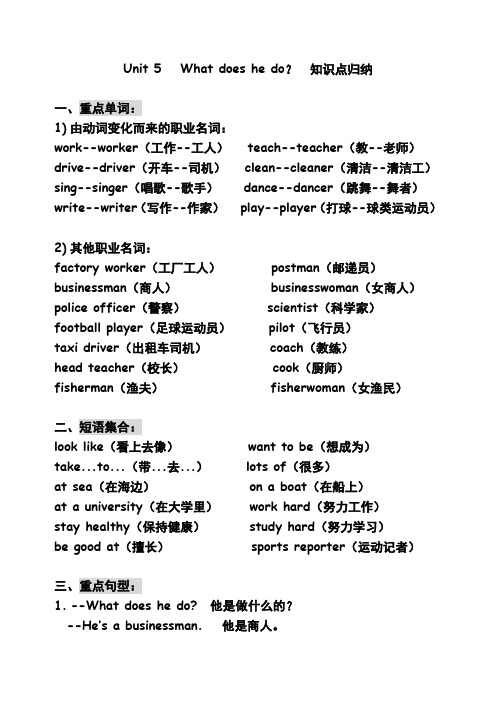
Unit 5What does he do?知识点归纳一、重点单词:1)由动词变化而来的职业名词:work--worker(工作--工人) teach--teacher(教--老师)drive--driver(开车--司机) clean--cleaner(清洁--清洁工)sing--singer(唱歌--歌手) dance--dancer(跳舞--舞者)write--writer(写作--作家) play--player(打球--球类运动员)2)其他职业名词:factory worker(工厂工人) postman(邮递员)businessman(商人) businesswoman(女商人)police officer(警察) scientist(科学家)football player(足球运动员) pilot(飞行员)taxi driver(出租车司机) coach(教练)head teacher(校长) cook(厨师)fisherman(渔夫) fisherwoman(女渔民)二、短语集合:look like(看上去像) want to be(想成为)take...to...(带...去...) lots of(很多)at sea(在海边) on a boat(在船上)at a university(在大学里) work hard(努力工作)stay healthy(保持健康) study hard(努力学习)be good at(擅长) sports reporter(运动记者)三、重点句型:1.--What does he do? 他是做什么的?--He’s a businessman. 他是商人。
解析:询问他人职业句式:--What do/does +主语 +do?= What +be动词 +主语?--主语 +be动词 +a/an +职业.例:What do you do? =What are you? 你是做什么的?What does she do? = What is she? 她是做什么的?2.--Where does he work? 他在哪儿工作?--He works at sea. 他在海上工作。
六年级英语上册讲解五单元

六年级英语上册讲解五单元
六年级英语上册讲解五单元的内容包括以下几个方面:
1. 词汇和语法:掌握常用的动词短语和介词短语,如“in the morning”、“on the weekend”、“go to the movies”等。
学习使用一般现在时态描述日常生活和兴趣爱好,例如“I usually get up at 7 o’clock in the morning”和“My favorite subject is science”。
2. 听力和口语:通过听力材料和课堂上的互动练习,提高听力和口语能力。
能够听懂简单的日常对话,并能与同学进行流利的英语交流。
通过模仿录音和与同学练习,培养英语发音和语调。
3. 阅读和写作:阅读理解简单的短文,如日记、电子邮件和邀请函等。
学习写简单的段落和书信,掌握基本的写作技巧,如段落结构、句子结构和语法规则等。
4. 文化知识:了解不同国家的文化和风俗习惯,如节日、食物、传统等。
通过阅读和听力材料,了解英语国家的文化背景和社会习俗,提高跨文化交流的能力。
5. 练习和活动:完成课本上的练习题,如选择题、填空题和简答题等。
积极参与课堂上的互动活动,如角色扮演、小组讨论和演讲等。
通过多样化的练习和活动,巩固所学知识和提高英语运用能力。
以上是六年级英语上册讲解五单元的主要内容,通过学习这一单元,学生能够进一步提高英语听、说、读、写能力,了解英语国家的文化背景,为以后的英语学习打下坚实的基础。
苏教版六年级上册英语知识点
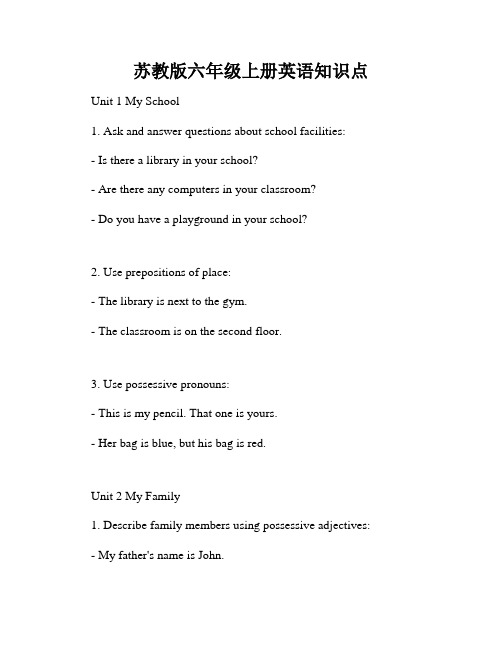
苏教版六年级上册英语知识点Unit 1 My School1. Ask and answer questions about school facilities:- Is there a library in your school?- Are there any computers in your classroom?- Do you have a playground in your school?2. Use prepositions of place:- The library is next to the gym.- The classroom is on the second floor.3. Use possessive pronouns:- This is my pencil. That one is yours.- Her bag is blue, but his bag is red.Unit 2 My Family1. Describe family members using possessive adjectives: - My father's name is John.- Her mother is a doctor.2. Talk about family relationships:- She is my aunt. He is my cousin.3. Use comparatives and superlatives:- My dad is taller than my mom.- My sister is the youngest in the family.Unit 3 My Week1. Use ordinal numbers to talk about days of the week: - I play soccer every first Sunday of the month.2. Use adverbs of frequency:- I usually go to bed at 10 pm.- He rarely eats candy.3. Talk about daily routines:- I wake up at 7 am every morning.- She brushes her teeth after breakfast.Unit 4 My Home1. Describe rooms and furniture:- There is a sofa in the living room.- My bedroom has a big wardrobe.2. Use prepositions to talk about the location of objects: - The lamp is on the table.- The bookshelf is against the wall.3. Give directions using prepositions:- Turn left at the corner.- Go straight ahead until you see the post office.Unit 5 Community Life1. Talk about community places:- We go to the park every Sunday.- The hospital is near the supermarket.2. Use present continuous tense to talk about ongoing activities: - They are cleaning the streets.- We are planting trees in the park.3. Give suggestions and opinions:- Let's have a picnic this weekend.- I think the city needs more recreational centers.Unit 6 Our Country1. Identify national symbols and landmarks:- The national flag has three colors: red, white, and blue.- The Great Wall is a famous landmark in China.2. Use present tense to talk about daily activities:- People work, study, and relax every day.- We celebrate national holidays.3. Talk about cultural customs and traditions:- Chinese New Year is a traditional festival.- We give red envelopes as gifts during the Spring Festival.以上是苏教版六年级上册英语的知识点。
苏教版六年级英语上册Unit5重点整理

Unit 5一单词:1.signs标志2. shopping centre 购物中心3.careful 小心,当心4.mean意思是5.floor地面6.litter乱扔垃圾7.restaurant 饭店,餐厅8. someone 某人9. smoke 烟11.outing 外出游玩,远足13. Danger! 危险15. subway 地铁(美式英语)10. smell 闻到12. around 在⋯周围14.underground 地铁(英式英语)16. should 应该二词组1.at a shopping centre 3. wet floor 小心地滑在购物中心2. be careful 小心4.see a juice shop 看见一家果汁店5 想要一些果汁 want some juice 6. go in 进入7. take your juice into the shop把你的果汁带进书店8. eat some noodles吃些面条9. in the restaurant 在餐馆10. smell it 闻到它11.say to sb对.某人说12. be on an outing/go on an outing远足13.看见那个公共标志see that pubic sign 14. 感觉又累又饿 feel hungry and tired15. look for the banana找香蕉16.give Sam a banana =give a banana to Sam给 Sam 香蕉17. walk on 继续走18.go to the bookshop 去书店19.find a sign on a tree 在树上发现一个标志20.see a lot of monkeys around them 看见他们周围许多猴子21.look at Bobby’ s bananas看鲍比的香蕉22.some public places 一些公共地方23. the little bird 这只小鸟24. so happy那么高兴25. call the metro 称地铁为26. pubic signs 公共场所27. know some pubic signs 了解公共标志28. design signs 设计标志29. listen and choose听和选30. No eating or drinking 禁止吃喝31. No littering 禁止扔垃圾32. No parking 禁止停车33.No smoking 禁止吸烟34.No fishing 禁止钓鱼35.No swimming 禁止游泳36.No pets 禁止宠物入内37.No feeding 禁止喂食38.No climbing 禁止爬树39.Keep off the grass 禁止践踏草坪40 Be quiet = Keep quiet 保持安静三.句子1. What does the sign mean? It means“ Wet floorIt means”. the floor is wet.这个标志什么意思?它的意思是小心地滑2.Whatdoes that sign mean?It means you can 。
英语六年级上Unit5单元要点

英语六年级上Unit5单元要点英语六年级上册Unit 5知识要点Body(⾝体部位):leg(腿),nose(⿐⼦)Adjectives(形容词):long(长的,⽐较级:longer),big(⼤的,⽐较级:big g er),small(⼩的,⽐较级:smaller),beautiful(美丽的),dirty(脏的),quiet(安静的),boring(⽆聊的)Districts(地区):Africa(⾮洲),Asia(亚洲),Arctic(北极)Verbs/Phrases(动词/短语):have got(有),eat(吃),live(住),ride(骑),give(给),build(建造),change(改变),find out(找出),want to(想要),dig(挖),see you(再见),save(挽救),takebaths(洗澡),kill(杀)Animals(动物):fox(狐狸),polar bear(北极熊),cow(奶⽜),rabbit(兔⼦),lion(狮⼦),horse(马),elephant(⼤象),sheep(⽺),tiger(⽼虎),kingfisher (翠鸟),rhino(犀⽜)Others(其他):milk(⽜奶),fur(⽪⽑),other(其他的),farm(农场),grass(草),hole(洞),nest(巢),riverbank(河堤),place(地⽅),web(⽹络),start(开始),bush(灌⽊丛),bamboo(⽵⼦),fruit(⽔果),leave(树叶),mud(泥巴),horn(⾓),medicine(药)1. ⼀般疑问句:(1)含有be动词(is,am,are)的⼀般疑问句,通常把be动词调到句⾸。
例:陈述句:It is a big animal.⼀般疑问句:Is it a big animal? (注:⼀般疑问句句末要⽤“?”)回答:Yes, it is.No, it isn’t.(2)含有情态动词(can...)的⼀般疑问句,把情态动词调到句⾸。
(完整版)苏教版译林版英语六年级上下两册知识点汇总整理归纳
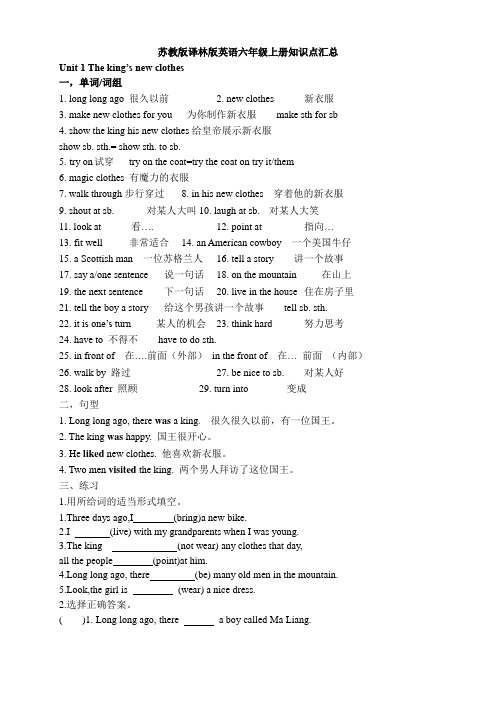
苏教版译林版英语六年级上册知识点汇总Unit 1 The king’s new clothes一,单词/词组1. long long ago 很久以前2. new clothes 新衣服3. make new clothes for you 为你制作新衣服make sth for sb4. show the king his new clothes给皇帝展示新衣服show sb. sth.= show sth. to sb.5.try on 试穿try on the coat=try the coat on try it/them6. magic clothes 有魔力的衣服7. walk through步行穿过8. in his new clothes 穿着他的新衣服9. shout at sb. 对某人大叫 10. laugh at sb. 对某人大笑11. look at 看….12. point at 指向…13. fit well 非常适合14. an American cowboy 一个美国牛仔15. a Scottish man 一位苏格兰人16. tell a story 讲一个故事17. say a/one sentence 说一句话18. on the mountain 在山上19. the next sentence 下一句话20. live in the house 住在房子里21. tell the boy a story 给这个男孩讲一个故事tell sb. sth.22. it is one’s turn 某人的机会23. think hard 努力思考24. have to 不得不have to do sth.25. in front of 在….前面(外部)in the front of 在… 前面(内部)26. walk by 路过27. be nice to sb. 对某人好28. look after 照顾29. turn into 变成二,句型1. Long long ago, there was a king. 很久很久以前,有一位国王。
小学六年级上册英语5单元知识点
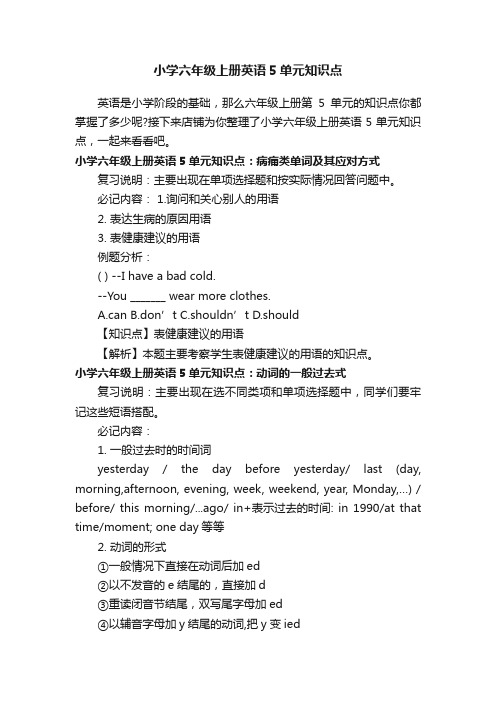
小学六年级上册英语5单元知识点英语是小学阶段的基础,那么六年级上册第5单元的知识点你都掌握了多少呢?接下来店铺为你整理了小学六年级上册英语5单元知识点,一起来看看吧。
小学六年级上册英语5单元知识点:病痛类单词及其应对方式复习说明:主要出现在单项选择题和按实际情况回答问题中。
必记内容: 1.询问和关心别人的用语2. 表达生病的原因用语3. 表健康建议的用语例题分析:( ) --I have a bad cold.--You _______ wear more clothes.A.canB.don’tC.shouldn’tD.should【知识点】表健康建议的用语【解析】本题主要考察学生表健康建议的用语的知识点。
小学六年级上册英语5单元知识点:动词的一般过去式复习说明:主要出现在选不同类项和单项选择题中,同学们要牢记这些短语搭配。
必记内容:1. 一般过去时的时间词yesterday / the day before yesterday/ last (day, morning,afternoon, evening, week, weekend, year, Monday,…) / before/ this morning/...ago/ in+表示过去的时间: in 1990/at that time/moment; one day等等2. 动词的形式①一般情况下直接在动词后加ed②以不发音的e结尾的,直接加d③重读闭音节结尾,双写尾字母加ed④以辅音字母加y结尾的动词,把y变ied以元音字母加y结尾的动词,直接加ed⑤不规则变化,需要勤记忆3. 句式变化句式一:肯定句:I was at home last evening.否定句:I wasn’t at home last evening.一般疑问句:Were you at home last evening?回答:Yes, I was. No, I wasn’t.句式二:肯定句: They cleaned the classroom yesterday.否定句:They didn’tclean the classroom yester day.一般疑问句:Did theyclean the classroom yesterday?回答:Yes, they did. No, they didn’t.4、熟记本课动词过去式不规则变化:is---was do--- did go--- went buy--- bought come--- camemeet--- metsee--- saw read--- read cut-- cut have-- had get-- got eat--atefeel--felt swim-- swam drink-- drank give-- gave leave-- left sing-- sang keep-- kept can-- could find--- found例题分析:( )1. Tom __________a bad cold last weekend.A. hadB. hasC. haveD. is【知识点】一般过去时。
江苏小学六年级英语U5知识整理

Unit5 知识整理一、单词clown小丑balloon气球snack 点心,零食drink 饮料fruit水果toy 玩具appear出现western西方的gift礼物arrive 到达minute分钟begin开始end结束play 戏剧anybody 任何人slow慢二、词组1. on Children’s Day 在儿童节2. this Sunday 本周日3. have a party 举行聚会4. at Mike’s house 在迈克的家(房子)里5. want to have some food 想要吃些食物6. bring some fruit from home 从家带来些水果7. bring some toys 带一些玩具8. play with her friends 和她朋友玩9. at the party 在聚会上10. be going to do准备做某事11. for the party 为聚会准备12. on Sunday morning 在周日上午13. bring their things to…把他们的东西带到…14. just then就在那时15. some balloons一些气球16. play with the toys 玩玩具17. have some fun 玩得愉快18. some food 一些食物19. play the piano 弹钢琴20. tell a story讲个故事21. put on a play 表演一个戏剧22. a Western party 一个西方聚会23. take a gift 带去一份礼物24. arrive too early 过早到达25. a few minutes late 晚几分钟26. will be the king 将要做国王27. look out of the window 朝窗外看28. Class Party 班级聚会29. this Sunday 这个星期日30. think of some party games 想一些聚会游戏31. buy some fruit from the supermarket 从超市买些水果32.lovely snow 可爱的雪花33.begin at six in Room 622六点在622房间开始34.end at 3o’clock结束于三点钟35. read the notes about a party 读关于聚会的注意点36.with snacks and drinks带着零食和饮料三、句子1. The children are going to have a party at Mike’s house. 孩子们将要在迈克的家里举办一个聚会。
苏教版六年级上册英语复习资料
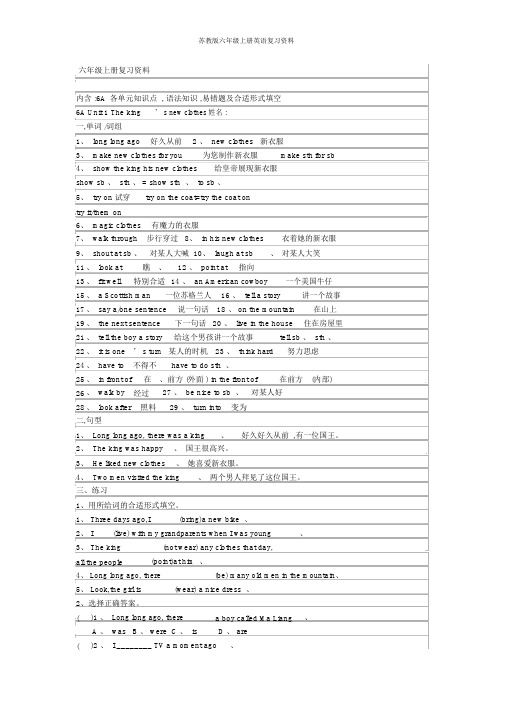
苏教版六年级上册英语复习资料六年级上册复习资料内含 :6A各单元知识点 , 语法知识 ,易错题及合适形式填空6A Unit 1 The king’ s new clothes姓名 :一,单词 /词组1、 long long ago好久从前 2 、 new clothes 新衣服3、 make new clothes for you为您制作新衣服make sth for sb4、 show the king his new clothes给皇帝展现新衣服show sb 、 sth 、 = show sth、 to sb 、5、 try on 试穿try on the coat=try the coat ontry it/them on6、 magic clothes有魔力的衣服7、 walk through步行穿过8、 in his new clothes衣着她的新衣服9、 shout at sb 、对某人大喊 10、 laugh at sb、对某人大笑11、 look at瞧、12 、 point at指向13、 fit well特别合适14 、 an American cowboy一个美国牛仔15、 a Scottish man一位苏格兰人16 、 tell a story讲一个故事17、 say a/one sentence说一句话18 、 on the mountain在山上19、 the next sentence下一句话20 、 live in the house住在房屋里21、 tell the boy a story给这个男孩讲一个故事tell sb 、 sth 、22、 it is one’ s turn某人的时机23 、 think hard努力思虑24、 have to不得不have to do sth 、25、 in front of在、前方 (外面 ) in the front of在前方(内部)26、 walk by经过27 、 be nice to sb 、对某人好28、 look after照料29 、 turn into变为二,句型1、 Long long ago, there was a king、好久好久从前 ,有一位国王。
苏教版译林六年级英语上册知识点归纳
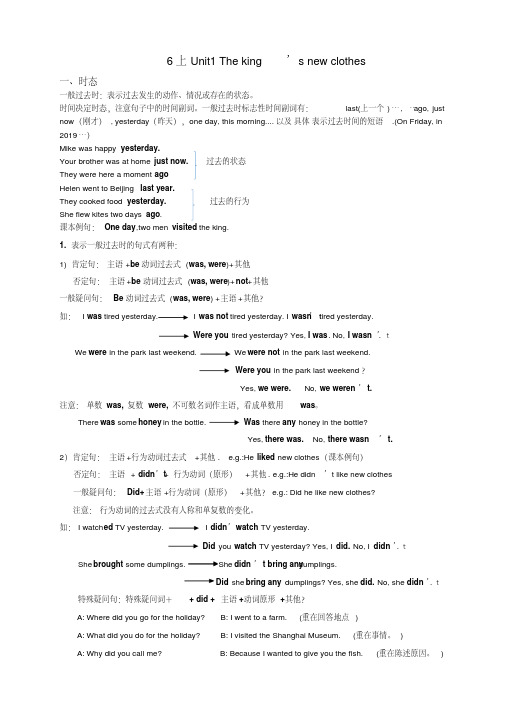
6上Unit1 The king’s new clothes一、时态一般过去时:表示过去发生的动作、情况或存在的状态。
时间决定时态,注意句子中的时间副词。
一般过去时标志性时间副词有:last(上一个)…, …ago, just now(刚才), yesterday(昨天),one day, this morning....以及具体表示过去时间的短语.(On Friday, in 2019…)Mike was happy yesterday.Your brother was at home just now.过去的状态They were here a moment agoHelen went to Beijing last year.They cooked food yesterday. 过去的行为She flew kites two days ago.课本例句:One day,two men visited the king.1. 表示一般过去时的句式有两种:1)肯定句:主语+be动词过去式(was, were)+其他否定句:主语+be动词过去式(was, were)+not+其他一般疑问句:Be动词过去式(was, were) +主语+其他?如:I was tired yesterday. I was not tired yesterday. I wasn’ttired yesterday..Were you tired yesterday? Yes, I was. No, I wasn’tWe were in the park last weekend. We were not in the park last weekend.Were you in the park last weekend?Yes, we were. No, we weren’t.注意:单数was, 复数were, 不可数名词作主语,看成单数用was。
苏教版六年级英语上册Unit5单元知识归纳
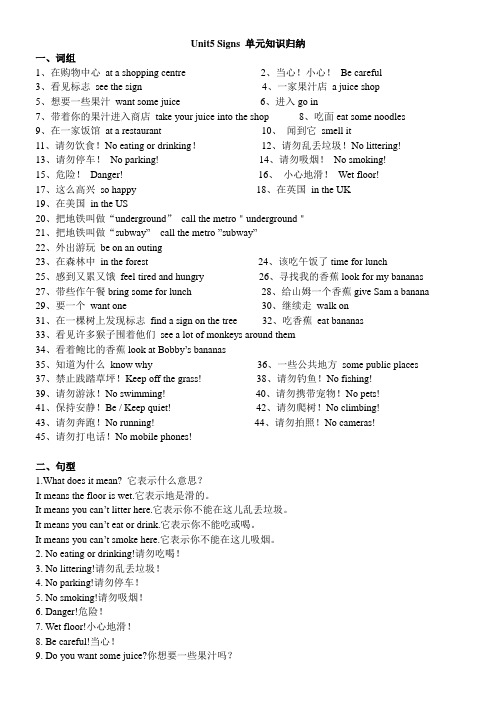
Unit5 Signs 单元知识归纳一、词组1、在购物中心at a shopping centre2、当心!小心!Be careful3、看见标志see the sign4、一家果汁店a juice shop5、想要一些果汁want some juice6、进入go in7、带着你的果汁进入商店take your juice into the shop 8、吃面eat some noodles9、在一家饭馆at a restaurant 10、闻到它smell it11、请勿饮食!No eating or drinking!12、请勿乱丢垃圾!No littering!13、请勿停车!No parking! 14、请勿吸烟!No smoking!15、危险!Danger! 16、小心地滑!Wet floor!17、这么高兴so happy 18、在英国in the UK19、在美国in the US20、把地铁叫做“underground”call the metro"underground"21、把地铁叫做“subway”call the metro ”subway”22、外出游玩be on an outing23、在森林中in the forest 24、该吃午饭了time for lunch25、感到又累又饿feel tired and hungry 26、寻找我的香蕉look for my bananas 27、带些作午餐bring some for lunch 28、给山姆一个香蕉give Sam a banana 29、要一个want one 30、继续走walk on31、在一棵树上发现标志find a sign on the tree 32、吃香蕉eat bananas33、看见许多猴子围着他们see a lot of monkeys around them34、看着鲍比的香蕉look at Bobby’s bananas35、知道为什么know why 36、一些公共地方some public places 37、禁止践踏草坪!Keep off the grass! 38、请勿钓鱼!No fishing!39、请勿游泳!No swimming! 40、请勿携带宠物!No pets!41、保持安静!Be / Keep quiet! 42、请勿爬树!No climbing!43、请勿奔跑!No running! 44、请勿拍照!No cameras!45、请勿打电话!No mobile phones!二、句型1.What does it mean? 它表示什么意思?It means the floor is wet.它表示地是滑的。
六年级英语上册第五单元知识点汇总

六年级英语上册第五单元知识点汇总六年级英语上册第五单元知识点汇总六年级英语上册第五单元知识点汇总Unit 5 What dose he do?⼀、单元词汇factory⼯⼚ worker⼯⼈ postman邮递员businessman商⼈pol警察 Fisherman渔民科学家 pilot飞⾏员coach 教练country国家 head teacher校长 sea⼤海 stay保持(动词) university⼤学gym体育馆 if如果记者 use使⽤(动词) type打字(动词)quickly迅速地(副词) secretary秘书⼆、Part A课⽂导⼊Sarah:Is your faday?Oliver:No. He’ s in Australia.Sarah:What does he do?Oliver:He’s a businessman. Hguarah:And what does youdo?Oliver:She’s a head teaarah:That’liver:Yeah. She ’ll bday!Sarah:Do you want to be a head teacher,too?Oliver:No,I want to be a businessma、here,副词,意为“这⾥” ,其反义词为“there”那⾥,kids. Let’s gature park!孩⼦们,到这⾥来,我们⼀起去⾃然公园!2、What does he do?他做什么的?What do/does+主语+do?这是⽤来询问职业的常⽤句型,意为“某⼈做什么的?” ,当主语为第三⼈称单数时,助动词⽤does。
其答语通常为:主语+be动词+ a/an +表⽰职业的名词。
例:——What does your father do?——He is an a——What do you do?——I am a basketball pla【拓展】询问职业还可以⽤句型“What+be动词+主语?”或“What+be动词+sb’s job?”What is your father?你爸爸做什么⼯作?(你爸爸是什么?)What is you’s job? 你妈妈做什么⼯作?(你妈妈的⼯作是什么?)3、she’ll bwill be, will 是“将会,将要”的意思,will+动词原形→will do sth,“将会做某事”will dwvening.I will be a great sing英语⾥的will(将会),should(应该),can(可以)的语法⽤法完全⼀致,将它们全部理解成情态动词即可,情态动词后接动词原形!4、Do you want to be a head teacher? 你想成为⼀名校长吗?“want to do sth”“be going to do sth”(1)我想吃汉堡包→ I want to eat hamburg我打算去吃汉堡包→ I am going to eat hamburg她想成为⼀名舞蹈员→ She wants to be a da她打算成为⼀名舞蹈员→going to be a dancer。
- 1、下载文档前请自行甄别文档内容的完整性,平台不提供额外的编辑、内容补充、找答案等附加服务。
- 2、"仅部分预览"的文档,不可在线预览部分如存在完整性等问题,可反馈申请退款(可完整预览的文档不适用该条件!)。
- 3、如文档侵犯您的权益,请联系客服反馈,我们会尽快为您处理(人工客服工作时间:9:00-18:30)。
Unit5 Signs 单元知识归纳
一、词组
1、在购物中心at a shopping centre
2、当心!小心!Be careful
3、看见标志see the sign
4、一家果汁店a juice shop
5、想要一些果汁want some juice
6、进入go in
7、带着你的果汁进入商店take your juice into the shop 8、吃面eat some noodles
9、在一家饭馆at a restaurant 10、闻到它smell it
11、请勿饮食!No eating or drinking!12、请勿乱丢垃圾!No littering!
13、请勿停车!No parking! 14、请勿吸烟!No smoking!
15、危险!Danger! 16、小心地滑!Wet floor!
17、这么高兴so happy 18、在英国in the UK
19、在美国in the US
20、把地铁叫做“underground”call the metro"underground"
21、把地铁叫做“subway”call the metro ”subway”
22、外出游玩be on an outing
23、在森林中in the forest 24、该吃午饭了time for lunch
25、感到又累又饿feel tired and hungry 26、寻找我的香蕉look for my bananas 27、带些作午餐bring some for lunch 28、给山姆一个香蕉give Sam a banana 29、要一个want one 30、继续走walk on
31、在一棵树上发现标志find a sign on the tree 32、吃香蕉eat bananas
33、看见许多猴子围着他们see a lot of monkeys around them
34、看着鲍比的香蕉look at Bobby’s bananas
35、知道为什么know why 36、一些公共地方some public places 37、禁止践踏草坪!Keep off the grass! 38、请勿钓鱼!No fishing!
39、请勿游泳!No swimming! 40、请勿携带宠物!No pets!
41、保持安静!Be / Keep quiet! 42、请勿爬树!No climbing!
43、请勿奔跑!No running! 44、请勿拍照!No cameras!
45、请勿打电话!No mobile phones!
二、句型
1.What does it mean? 它表示什么意思?
It means the floor is wet.它表示地是滑的。
It means you can’t litter here.它表示你不能在这儿乱丢垃圾。
It means you can’t eat or drink.它表示你不能吃或喝。
It means you can’t smoke here.它表示你不能在这儿吸烟。
2. No eating or drinking!请勿吃喝!
3. No littering!请勿乱丢垃圾!
4. No parking!请勿停车!
5. No smoking!请勿吸烟!
6. Danger!危险!
7. Wet floor!小心地滑!
8. Be careful!当心!
9. Do you want some juice?你想要一些果汁吗?
10. What do these signs mean?这些标志什么意思?
11. Helen wants to go in.海伦想要进来。
12. Is someone smoking?有人吸烟吗?
13. I can smell it.我能闻到它。
14. Bobby and Sam are on an outing in the forest.鲍比和山姆在森林里游玩。
15. I know why we shouldn’t eat bananas here!我知道为什么我们不应该在这儿吃香蕉了!
三、语音
ir bird dirty girl shirt skirt birthday
thirty thirsty first third circle
四、语法
1、公共标识的英文构成方式有:
●No+ doing, 如:No smoking! No eating or drinking!...
●No+名词复数如:No pets! No cameras!...
●名词或名词短语如:Danger!…
●祈使句,如Turn right! Be quiet!...
2、No eating or drinking! 请勿饮食!
●在否定句中,如果要否定两种或多种事物时,一般要用连词or,意思是“也不”。
如:
He can’t read or write. 他不会读,也不会写。
He never smokes or drinks. 他从不抽烟,也不喝酒。
3、You can’t take your juice into the shop, Helen.海伦,你不能把果汁带进书店里。
●take和bring在意义和用法上的区别:
一般来说,take 表示从说话者所处位置向另一处,意思是“带去”;而bring表示从别处向说话者所处位置,意思是“带来”。
如:
Su Yang, please bring the book to me and take the flowers to Helen.
苏洋,请把那本书拿给我,再把这些花带给海伦。
4、Bobby and Sam are on an outing in the forest.鲍比和萨姆在森林里游玩。
●on an outing 是“在远足”、“在郊游”的意思。
表示“去郊游”时,还可以说
go on an outing, go for an outing, have an outing …
●on 在这里用于说明活动或状态,表示“在从事……中”、“处于……情况下”的意思。
5、Bobby and Sam walk on.博比和萨姆继续走着。
●on 在这里是个副词,意思是“继续下去”。
The lesson goes on. 课继续进行下去。
6、on the tree 和in the tree 的区别:
on the tree 表示东西附着在树上或者花果等东西长在树上。
如:
There are many pears on the tree.树上结着许多梨子。
in the tree 表示外来的东西在树上。
如:
Look! There is a bird in the tree. 瞧!树上有一只鸟。
